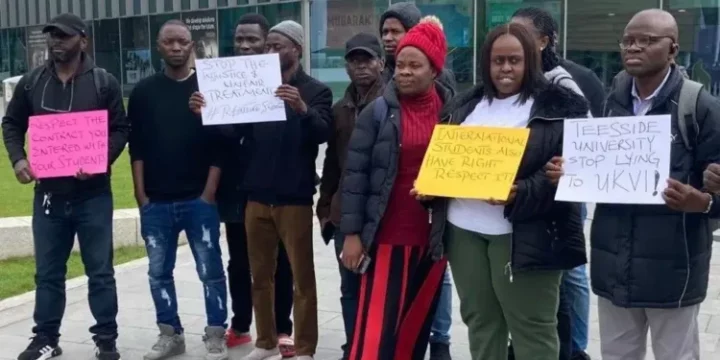
The drastic devaluation of Nigeria's currency and high inflation have significantly affected Nigerian students at Teesside University, forcing many to discontinue their studies and leave the UK due to their inability to pay tuition fees on time.
Despite the students' pleas and efforts to negotiate payment plans, the university enforced strict visa compliance rules, leading to the students' accounts being frozen and their visas revoked, as non-payment breaches the conditions of their visa sponsorship.
The affected students reported severe emotional distress and inadequate support from the university, despite the institution's claim of offering individualized assistance and flexible payment options.
They have now been forced to discontinue their studies and leave the UK.
Some of these students, devastated by the situation, told the BBC that they felt driven to despair by what they saw as the university's insensitive handling of their payment difficulties.
According to a university spokesperson, non-payment breached the conditions of their visa sponsorship, leaving the university with "no choice" but to inform the Home Office.
The Home Office however clarified that decisions regarding visa sponsorship are the responsibility of the educational institution.
High inflation in Nigeria
The economic downturn in Nigeria, described as the worst in decades, has hit hard, affecting Nigerian students abroad, particularly at some UK universities.
With inflation nearing 30%, and recent government attempts to introduce a new currency exacerbating the situation, the students' pre-verified funds to cover tuition and living expenses dwindled significantly.
Additionally, changes at the university from a seven-installment tuition fee payment plan to three installments compounded the students' financial troubles.
This group of 60 students shared their plight after some had their university accounts frozen and were involuntarily withdrawn from their courses due to non-payment, with some also facing actions from debt collection agencies employed by the university.
Complaints from the aggrieved students
One of the affected students, Adenike Ibrahim, was nearing the completion of her dissertation after two years of study when she missed a payment.
Despite settling her outstanding fees later, she was not allowed to re-enroll and was instructed to leave the UK with her young son.
"I did default [on payments], but I'd already paid 90% of my tuition fees and I went to all of my classes.
"I called them and asked to reach an agreement, but they do not care what happens to their students", she said.
She said the experience was "horrendous" and she did not know what was happening with her qualification.
"It has been heartbreaking for my son especially, he has been in so much distress since I told him," Ms Ibrahim added.
One master's degree student, who chose to remain anonymous, admitted to the BBC that he had considered suicide and had stopped eating and drinking since receiving his letter. Despite these dire circumstances, the university claimed it had done "every effort" to assist affected students by offering individual meetings with specialist staff and creating customized payment plans upon request.
Esther Obigwe reported that she had repeatedly attempted to discuss her financial difficulties with the university but received no response until she was also blocked from her studies and ordered to leave the country.
"I attended all of my classes and seminars, I'm a hell of an active student," she said.
"It is disheartening, I am now on antidepressants and being here alone, I have nobody to talk to.
"For over two months, I've barely eaten or slept and I don't understand why this is being meted at us, we didn't do anything wrong."
Jude Salubi, a student training to be a social worker, was in the middle of a placement when his university access was suspended and he received a directive to leave the UK.
Before this, he had been commuting from Teesside to Liverpool every weekend to work 18 hours in an effort to clear his outstanding fees.
"As of now I have paid £14,000 and have a balance of £14,000," he explained.
Salubi expressed his willingness to negotiate a payment plan, stating, "I am willing to come to an agreement as to how I will make this payment, but I need guarantees that I will be re-enrolled into school and my visa restored."
Several students have managed to settle their outstanding fees; however, Teesside University has been unable to influence the Home Office's process regarding their visa status.
No right of appeal
The Home Office informed students, including Ms. Ibrahim, that their permission to stay in the UK was revoked because they were no longer enrolled at the university.
According to letters reviewed by the BBC, these students were given a specific departure date and were told that they had no "right of appeal or administrative review against the decision."
What the university is saying
A university spokesman stated that while Teesside University values its diverse international student body, it must adhere to strict visa issuance and compliance regulations that support the UK's immigration system and are beyond the university's control.
The university acknowledged the financial difficulties some students are facing and has offered tailored payment plans, which many international students have accepted. Nonetheless, according to them, some have still failed to meet the requirements of these revised plans.
The Home Office has maintained that decisions regarding visa sponsorship are the responsibility of the educational institution and advises individuals whose visas have been shortened or cancelled to either regularize their stay or arrange to leave the UK.
















Comments